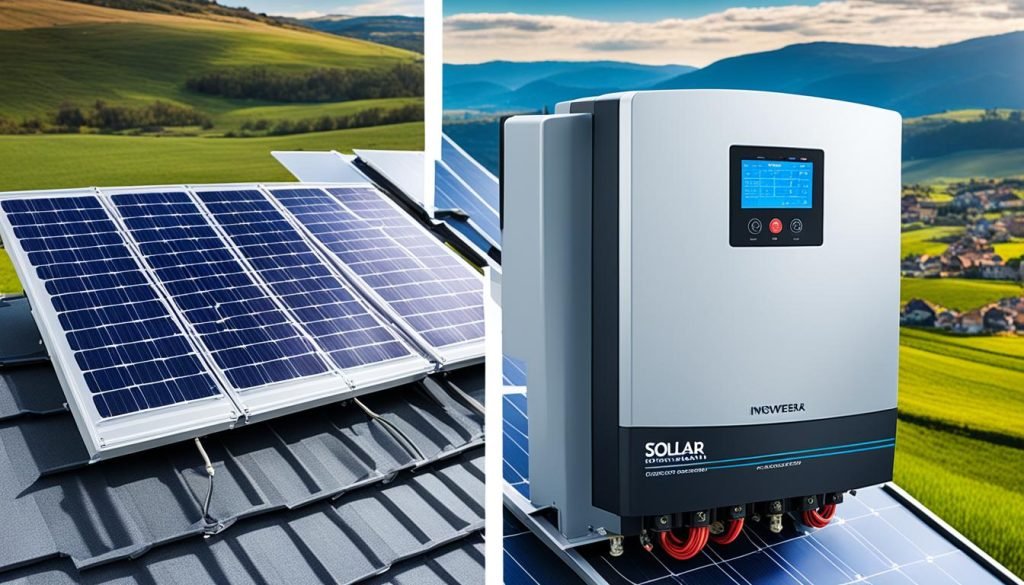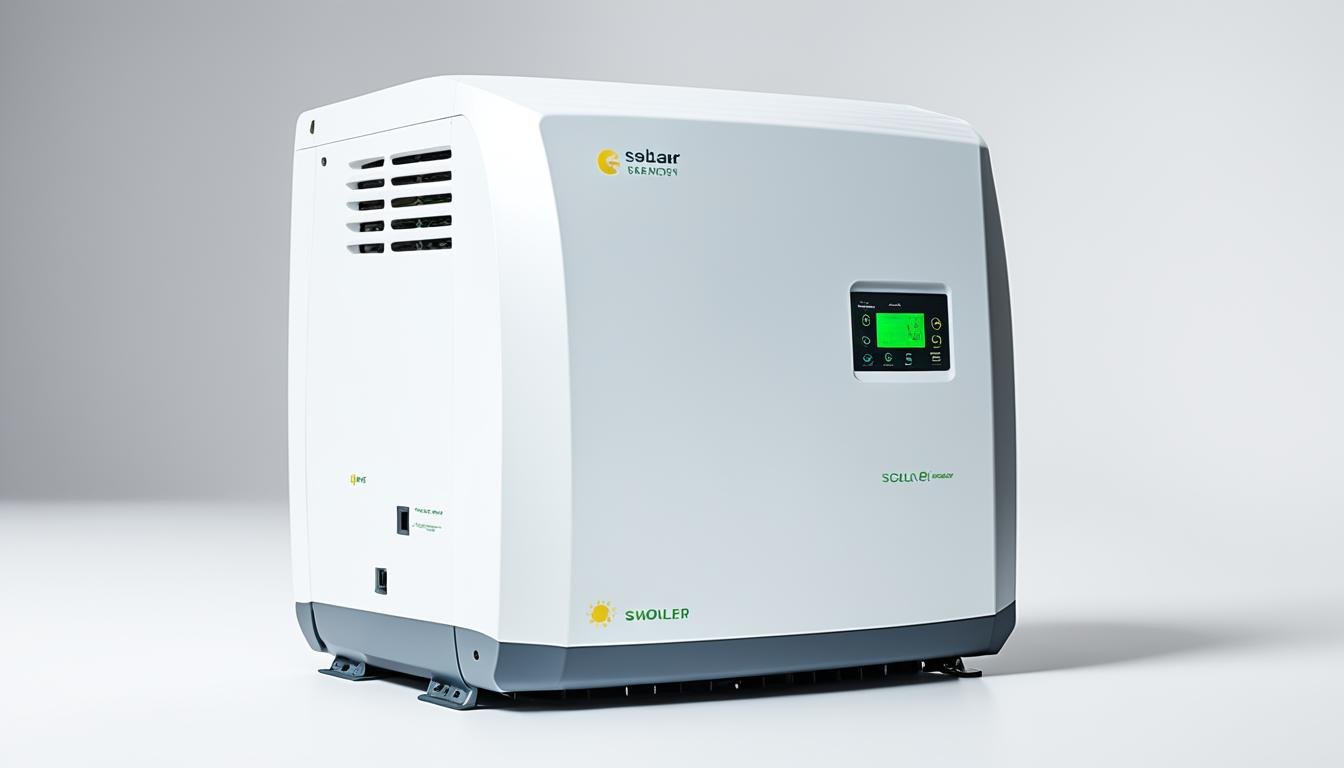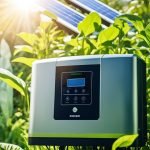Did you know that the cost of solar inverters has dropped by an astonishing 80% in the past decade? As solar energy continues to gain traction as a viable alternative to traditional electricity sources, the affordability of solar inverters has become a game-changer for homeowners looking to harness the power of the sun. In this comprehensive guide, we’ll provide you with an in-depth look into affordable solar inverters in 2024. Discover the latest prices and options available for South African households, and find the best solar inverter for your budget and energy needs.
Key Takeaways:
- The cost of solar inverters has dropped by 80% in the past decade.
- Solar energy is rapidly becoming a cost-effective alternative to traditional electricity sources.
- South African households can now access affordable solar inverters.
- This guide will help you find the best solar inverter for your budget and energy requirements.
- Investing in solar energy can lead to long-term cost savings.
Understanding Solar Inverters and Their Role in a Solar System
In this section, we’ll delve into the functions and importance of solar inverters in a solar system. Solar inverters play a vital role in converting the DC power generated by solar panels into AC power, which is suitable for powering household appliances and being fed back into the electrical grid.
Solar inverters act as the bridge between solar panels and the electrical systems of homes or businesses. They ensure that the energy generated by the panels is transformed into a usable form, enabling the efficient distribution of solar power throughout the premises.
When sunlight strikes the solar panels, they produce direct current (DC) electricity, which is a type of electricity that flows in one direction. However, most homes and appliances run on alternating current (AC) electricity, which flows back and forth rapidly. This is where solar inverters come into play.
The main function of a solar inverter is to convert the DC power from solar panels into AC power. It adjusts the voltage and frequency of the electricity to match the electrical grid and the appliances in the premises. By doing so, solar inverters enable the electricity generated by solar panels to power household devices, reducing reliance on grid electricity and lowering energy costs.
Moreover, solar inverters play a crucial role in ensuring the safety and efficiency of the solar system. They monitor the power output of the solar panels, ensure the system operates within safe voltage limits, and protect against voltage spikes or fluctuations. In addition, some advanced solar inverters offer monitoring capabilities, allowing homeowners to track their energy usage and system performance in real-time.
Note that solar inverters are not one-size-fits-all. They vary in terms of capacity, efficiency, and functionality. Choosing the right solar inverter for your solar system is essential to maximize its performance and ensure optimal energy production.
Now that we’ve explored the functions and significance of solar inverters in a solar system, let’s move on to discussing the pricing and investment aspects in the next section.
Decoding Solar Inverters Price: Investment and Long-term Savings
When considering solar power, it’s important to understand the investment aspect of solar inverters and the potential for long-term savings. While the upfront costs of solar inverters may seem significant, they can lead to substantial savings on electricity bills over time. By harnessing the power of the sun, solar inverters enable households to generate their own clean energy and reduce reliance on the grid.
Investing in a solar inverter allows homeowners to take control of their energy consumption and future-proof their properties against rising energy costs. With South Africa’s abundant sunlight, solar inverters provide a lucrative return on investment, generating renewable energy and reducing carbon emissions.
By installing a solar inverter, households can enjoy long-term savings and potentially even eliminate their electricity bills. The use of solar power not only reduces monthly expenses but also provides protection against future price hikes in traditional energy sources. This makes solar inverters an attractive option for South African households looking to embrace sustainable and cost-effective energy solutions.
Comparing Top Solar Inverter Brands: Efficiency Meets Affordability
When it comes to choosing a solar inverter for your home, finding the right balance between efficiency and affordability is crucial. In this section, we will compare three top solar inverter brands: Deye, SolarEdge, and Tesla. Let’s explore their unique features and benefits to help you make an informed decision.
Deye: A Synthesis of Quality and Value
Deye is a leading solar inverter brand known for its commitment to quality and value. Their inverters are designed to maximize energy production, ensuring optimal efficiency for your solar panel system. With Deye, you can expect reliable performance and long-term durability.
One key feature of Deye inverters is their advanced MPPT (Maximum Power Point Tracking) technology. This technology enables the inverter to extract the maximum power from your solar panels, maximizing energy production even in challenging weather conditions.
Additionally, Deye inverters come with a user-friendly interface that allows for easy monitoring and control of your solar system. This makes it convenient for homeowners to track their energy production and make adjustments as needed.
SolarEdge: Pioneering Innovations for Your Home
SolarEdge is another top solar inverter brand that focuses on innovative solutions for residential solar systems. Their inverters are renowned for their power optimization technology, which allows each solar panel to operate at its maximum capacity.
One notable feature of SolarEdge inverters is their ability to monitor the performance of each individual solar panel. This enables you to identify and address any issues promptly, ensuring optimal energy production at all times.
SolarEdge also offers smart energy management solutions, allowing you to integrate your solar system with other smart devices in your home. This integration enhances energy efficiency and provides greater control over your energy consumption.
Tesla: Integrating Solar with Smart Home Technology
Tesla, a renowned name in the renewable energy industry, offers solar inverters that seamlessly integrate with their smart home technology. Their inverters are designed to work in synergy with Tesla Powerwall, a state-of-the-art energy storage solution.
With Tesla solar inverters, you can harness the power of solar energy during the day and store it for use during peak demand or during power outages. This ensures a consistent and uninterrupted power supply for your home.
In addition to their energy storage capabilities, Tesla inverters feature advanced monitoring and control functionalities. Through the Tesla app, homeowners can easily monitor their energy production, consumption, and storage, providing valuable insights for optimizing energy usage and savings.
Now that we have explored the unique features of these top solar inverter brands, you can better understand the efficiency and affordability they offer. Consider your specific needs and budget when selecting the right solar inverter for your home.
Analysing Solar Inverter Types: Which Suits Your Needs Best?
Understand the different types of solar inverters and their suitability for various needs. We’ll explore grid-tied inverters, which are ideal for households connected to the grid, off-grid inverters for energy independence, and hybrid inverters that offer the best of both worlds. Find the perfect solar inverter type for your specific requirements.
Grid-Tied Inverters: The Foundation for Solar Integration
Grid-tied inverters are the most common type of solar inverters used in households. They are designed to work in conjunction with the power grid, allowing electricity to flow both ways. During the day, when the sun is shining and the solar panels generate excess electricity, it is fed back into the grid, resulting in a reduction in your electricity bill. At night or when there is insufficient solar energy, power is drawn from the grid. Grid-tied inverters are a cost-effective option for homeowners looking to offset their electricity usage and reduce their carbon footprint.
Off-Grid Inverters: Empowering Energy Independence
Off-grid inverters are the solution for homeowners who want complete energy independence. These inverters are designed to work without any connection to the power grid. They are paired with battery storage systems that store excess electricity generated during the day for use at night or during cloudy days. Off-grid inverters allow homeowners to generate and use their own electricity, even in remote areas where grid access is limited or not available. They provide independence from utility companies and offer a reliable source of power in off-grid locations.
Hybrid Inverters: The Best of Both Worlds
Hybrid inverters combine the features of both grid-tied and off-grid inverters. They provide the flexibility to operate in either grid-tied or off-grid mode, depending on the availability of solar energy and the homeowner’s preferences. Hybrid inverters can use solar energy stored in batteries during periods of high electricity demand, reducing reliance on the grid and maximizing self-consumption. They are the perfect choice for homeowners who want the benefits of both grid-tied and off-grid systems, allowing them to use solar energy while still having the option to draw power from the grid when needed.

| Solar Inverter Type | Suitability | Advantages |
|---|---|---|
| Grid-Tied Inverters | Ideal for households connected to the power grid |
|
| Off-Grid Inverters | Enables energy independence |
|
| Hybrid Inverters | Offers flexibility and the best of both worlds |
|
The Solar Inverters Price Guide for South African Households
Dive into our in-depth solar inverters price guide specifically tailored for South African households. We’ll provide you with a comprehensive overview of the prices and options available in the market, helping you make an informed decision about your solar inverter purchase.
Identifying the Best Solar Inverter for Your Home in 2024
When choosing a solar inverter for your home in 2024, it’s important to consider custom solutions that are tailored to your unique energy profile. By finding an inverter that matches your specific requirements, you can optimize the performance and efficiency of your solar system.
Custom Solutions: Tailoring the Inverter to Your Unique Energy Profile
Every home has its own energy needs and consumption patterns. By selecting a solar inverter that is customized to your unique energy profile, you can ensure that your system operates at its highest potential. Whether you have specific power requirements or limited roof space, a custom solution will help maximize the energy output and overall performance of your solar system.
Battery Compatibility: Pairing Inverters with the Right Energy Storage
In addition to custom solutions, it’s essential to consider battery compatibility when choosing a solar inverter. Energy storage systems, such as batteries, can significantly enhance the capabilities of your solar system by allowing you to store excess energy for later use. When selecting a solar inverter, ensure that it is compatible with the right energy storage solution for your needs. This compatibility will enable you to harness the full benefits of energy storage and optimize your energy usage throughout the day.
By identifying the best solar inverter for your home in 2024, through custom solutions and battery compatibility, you can maximize your energy efficiency, reduce your electricity costs, and make a positive impact on the environment.
Factors Influencing the Price of Solar Inverters in 2024
When considering the purchase of a solar inverter, it’s essential to understand the factors that can influence its price in 2024. By examining these factors, you can make an informed decision and ensure that you get the best value for your investment.
System Size: The size of the solar system you intend to install can have a significant impact on the price of the inverter. Generally, larger systems require more powerful inverters, which can be more expensive.
Brand Reputation: The reputation of the brand you choose can affect the price of the solar inverter. Well-established brands with a solid track record of performance and reliability tend to have higher price points compared to lesser-known brands.
Efficiency Ratings: The efficiency of the solar inverter plays a crucial role in determining its price. Inverters with higher efficiency ratings tend to be more expensive since they can convert a larger proportion of the solar energy into usable electricity, maximizing your system’s overall energy output.
Warranty Periods: The length of the warranty offered by the manufacturer can affect the price of the solar inverter. In general, inverters with longer warranty periods have a higher upfront cost but provide greater peace of mind, as they are covered against potential defects or failures for an extended period.
Installation Complexity: The complexity of the installation process can impact the price of the solar inverter. If your installation requires additional equipment or labor-intensive work, such as roof modifications or wiring upgrades, it may result in a higher overall cost.
By considering these factors, you can gain a better understanding of the price range for solar inverters in 2024 and choose the option that best suits your budget and requirements.
Maximising Return on Investment with Solar Inverter Upgrades
When it comes to solar energy, maximizing return on investment is a key consideration for homeowners. One effective way to achieve this is through solar inverter upgrades. These upgrades offer various benefits that enhance the performance and efficiency of your solar system, ultimately leading to long-term cost savings and increased energy efficiency.
Real-time Monitoring and Advanced Management Features
One of the significant advantages of solar inverter upgrades is the integration of real-time monitoring and advanced management features. These features allow you to have better control and visibility over your solar system’s performance. With real-time monitoring, you can track the energy production of your solar panels, identify any issues or inefficiencies, and make timely adjustments to optimize energy generation.
The advanced management features enable you to monitor and control your solar system remotely, enhancing convenience and flexibility. You can access important information and control settings via mobile apps or online platforms. This capability empowers you to make informed decisions and respond swiftly to maximize energy production and efficiency.
With real-time monitoring and advanced management features, you can keep track of your return on investment by ensuring optimal functioning of your solar system, identifying and resolving any issues promptly, and maximizing energy generation to offset your electricity consumption.
Expandability: Planning for Future Energy Needs
Another key aspect of solar inverter upgrades is their expandability. Solar inverter systems can be designed to accommodate future energy needs, allowing for the addition of more solar panels or other energy storage solutions like batteries. This expandability provides a strategic advantage in planning for future energy requirements and ensures that your solar system can adapt to your changing needs.
By investing in solar inverter upgrades that offer expandability, you can future-proof your energy solution. As your energy needs grow over time, you can easily scale up your solar system without the need for significant modifications or additional investments. This scalability enhances the return on investment as it allows you to leverage the full potential of solar energy and maximize cost savings.

Table
| Benefit | Description |
|---|---|
| Increased Energy Production | Solar inverter upgrades optimize energy generation, maximizing the electricity produced by your solar panels. |
| Cost Savings | By improving the efficiency of your solar system, you can reduce your reliance on grid electricity, leading to lower utility bills. |
| Enhanced System Performance | Upgraded solar inverters offer better reliability, improved power conversion, and advanced features that optimize system performance. |
| Long-Term Investment | Solar inverter upgrades increase the lifespan of your solar system, ensuring a more extended period of cost savings and return on investment. |
| Flexibility and Adaptability | With expandable solar inverters, you can easily incorporate additional solar panels or energy storage solutions as your energy needs change. |
Investing in solar inverter upgrades is a strategic decision that can significantly impact your return on investment. By harnessing real-time monitoring, advanced management features, and expandability, you can optimize energy production, reduce costs, and future-proof your solar system. Make the most of solar energy and unlock its full potential with solar inverter upgrades.
Solar Inverter Specifications and Their Impact on Efficiency
When it comes to solar energy systems, the specifications of your solar inverter play a crucial role in determining the overall efficiency of your system. Understanding these specifications is essential for making an informed decision about the right solar inverter for your needs.
Let’s delve into some key specifications:
- Input Voltage: The input voltage range determines the compatibility of the solar inverter with your solar panels. Different solar panel configurations require specific input voltage ranges for optimal performance.
- Output Power: The output power rating of the solar inverter indicates the maximum power it can deliver to your household appliances. It is important to choose a solar inverter that can handle the energy requirements of your appliances.
- Efficiency Ratings: Solar inverter efficiency refers to how effectively it converts DC power from the solar panels into usable AC power. Higher efficiency ratings indicate less energy loss during the conversion process, resulting in better overall system performance.
- Protection Features: Solar inverters often come with built-in protection features such as overvoltage protection, short-circuit protection, and ground-fault protection. These features safeguard your system from electrical faults and ensure the longevity of your solar inverter.
By considering these specifications and selecting a solar inverter that aligns with your system requirements, you can maximize the efficiency of your solar energy system and optimize your energy savings.
“Choosing the right solar inverter specifications is crucial for maximizing your system’s efficiency and optimizing energy savings.”
Take a look at the visual representation of solar inverter specifications:
| Specification | Description |
|---|---|
| Input Voltage | The range of voltage that the solar inverter can accept from the solar panels. |
| Output Power | The maximum power the solar inverter can deliver to household appliances. |
| Efficiency Ratings | The measure of how effectively the solar inverter converts DC power to usable AC power. |
| Protection Features | Built-in safeguards against electrical faults to protect the solar inverter. |
Conclusion
Our comprehensive guide has provided valuable information to help you navigate the world of affordable solar inverters in 2024. From understanding their functions and importance to comparing top brands, analyzing different types, and exploring factors influencing prices, we’ve covered the essential aspects of solar inverters.
By using this guide, you can now make an informed decision and find the best solar inverter option for your home. Investing in a solar inverter not only ensures a greener energy solution but also offers long-term cost-effectiveness. Take the next step towards energy independence and a sustainable future.
Solar Inverters Price in 2024 – Find the Best Option for Your Home
Don’t miss out on the opportunity to embrace solar power. With our guide, you have the tools to find the perfect solar inverter for your specific needs. Consider the functions, efficiency, affordability, and long-term benefits when making your decision. By selecting the right solar inverter, you can enjoy the advantages of clean energy while saving on electricity costs.



